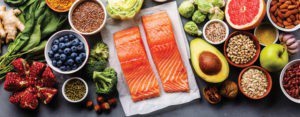By Caroline Cederquist, M.D.
 Face it. We’re all getting older. It’s a fact of life. Contrary to popular belief, getting older doesn’t mean a decrease in quality of life.
Face it. We’re all getting older. It’s a fact of life. Contrary to popular belief, getting older doesn’t mean a decrease in quality of life.
You can remain lively, active and mentally sharp. Diet plays a significant role in doing all three. One nutrient, in particular, may be able to help with aging gracefully. Allow us to introduce folic acid.
Folic Acid History
You may have seen folic acid (FA) listed as an ingredient in foods like bread and cereal. This B vitamin is the man-made equivalent of naturally-occurring vitamin B9, also known as folate. The U.S. Food and Drug Administration requires that food manufacturers enrich some grain-based foods with FA and a few other vitamins. This process is known as enrichment or fortification. FA, in particular, is added to foods to help prevent neural tube defects (NTDs) in developing fetuses. It’s the reason fewer babies are born with spinal and brain deformities. In the U.S., FA fortification decreased NTDs by as much as 32%.
The Benefits Of Folic Acid
FA is not only beneficial for pregnant women. As we mature, we continue to need FA for healthy brain and nerve function. Low folate is associated with poor cognition. In patients with Alzheimer’s Disease, one study found a relationship between FA supplementation and cognitive function. Patients with Alzheimer’s who received a FA supplement experienced an improvement in cognitive function and a decrease in inflammatory markers. Inflammation is a known risk factor for dementia, so less inflammation could mean a halt in mental decline.
FA has also been shown to reduce the risk of cardiovascular disease, especially among populations with low serum folate levels. FA is thought to improve vascular health by lowering circulating levels of the amino acid homocysteine. Elevated homocysteine levels are associated with cardiovascular disease, heart attack and stroke.
Premature hearing loss and cancer also share a relationship with FA. FA deficiency is associated with a decline in auditory function and certain forms of cancer. Cancer prevention is especially important as we get older because cancer risk increases with age.
How Much Folic Acid Do You Need?
It’s recommended that everyone 18 years of age and older consume around 400 mcg of FA or folate daily. (Remember: folate is the naturally-occurring form of FA.) Children’s recommendations are based on their age. They should consume anywhere from 65 to 400 mcg.
Supplements are one option for meeting daily FA needs. As always, it’s best to check with a health care provider before taking any supplements or giving them to children. Safety with supplements is a must because overconsumption of FA is possible. Taking more than 1000 mcg of FA daily can be harmful. If you prefer to avoid supplements altogether, opting for dietary sources of folate is a healthy alternative.
Dietary Sources of Folate
It is easy to meet your body’s FA needs! There are a variety of foods, mostly fruits and vegetables, that naturally contain high levels of folate. Check out a few below:
Edamame (green soybeans) – 482 mcg per cup
Roman beans (cooked) – 366 mcg per cup
Black-eyed peas (cooked) – 356 mcg per cup
Lentils (cooked) – 358 mcg per cup
Asparagus (cooked) – 268 mcg per cup
Spinach (cooked) – 263 mcg per cup
Broccoli (cooked) – 168 mcg per cup
Avocado (regular-sized) – 163 mcg each
Guava – 80 mcg per cup
Mango – 71 mcg per cup
Pomegranate – 66 mcg per cup
Lettuce – 64 mcg per cup
Folic Acid for Continued Health
Our need for folic acid does not decrease as we get older. If anything, FA becomes even more important for maintaining cognitive function, heart health and mental clarity. FA helps our bodies perform at their best. Knowing the facts of this vitamin will help you navigate eating for health and longevity, perhaps making your latter years your best!
If you’re struggling to lose weight as you age, we can help. Call us at 239-734-4486 to set an appointment. Don’t wait!
Cederquist Medical Wellness Center
239-734-4486
1575 Pine Ridge Road
Suit 19
Naples, FL









